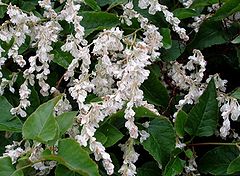Fallopia baldschuanica
| Fallopia baldschuanica subsp. var. | Russian vine; mile-a-minute vine; China fleece vine; fleece flower; silver lace vine | |||||||||||||||||||||||||||||||||||||||||||||||||||||||
|---|---|---|---|---|---|---|---|---|---|---|---|---|---|---|---|---|---|---|---|---|---|---|---|---|---|---|---|---|---|---|---|---|---|---|---|---|---|---|---|---|---|---|---|---|---|---|---|---|---|---|---|---|---|---|---|---|

|
|
| ||||||||||||||||||||||||||||||||||||||||||||||||||||||
| ||||||||||||||||||||||||||||||||||||||||||||||||||||||||
Fallopia baldschuanica (syn. Fallopia aubertii, Polygonum baldschuanicum) is a species of flowering plant in the knotweed family known by several common names, including Bukhara fleeceflower, Chinese fleecevine, and silver lace vine. It is native to Asia, particularly western China and Tibet, and it can be found growing wild in parts of Europe and North and Central America as an introduced species. It is grown as an ornamental plant for its flower-laced vines, and it is a fast-growing plant that has the capacity to become an invasive species.
This is a vining plant with woody, climbing stems known to reach ten meters in maximum length. The pointed oval or nearly triangular leaves are up to ten centimeters long and borne on petioles. The inflorescence is an open array of narrow, branching, drooping or spreading clusters of flowers, each cluster reaching a maximum of 15 centimeters long. Flowers hang on short pedicels. Each five-lobed flower is just under a centimeter long and white to greenish or pale pink, sometimes turning bright pink as the fruit develops. The fruit is a shiny black achene about 2 millimeters wide.
| Standard Cyclopedia of Horticulture |
|---|
|
Polygonum baldschuanicum, Regel. Tall perennial climber becoming woody at the base: lvs. cordate-oval or hastate, acuminate, slender-pettioled: fls. small but very numerous, in terminal erect or drooping panicles, mostly rose-colored; fruiting calyx small, 3-sided, at first whitish and then becoming rose-colored: achene shining black. Bokhara.—A very vigorous and decorative hardy plant, climbing 20 ft. high, and, under favorable conditions, producing a profusion of pinkish, or sometimes whitish bloom; hardy N., and worthy greater attention. It was first described by Regel in 1884; bears the name of the town or place Baldschuan. CH
|
Cultivation
- Do you have cultivation info on this plant? Edit this section!
Propagation
- Do you have propagation info on this plant? Edit this section!
Pests and diseases
- Do you have pest and disease info on this plant? Edit this section!
Species
Gallery
If you have a photo of this plant, please upload it! Plus, there may be other photos available for you to add.
References
- Standard Cyclopedia of Horticulture, by L. H. Bailey, MacMillan Co., 1963
External links
- w:Fallopia baldschuanica. Some of the material on this page may be from Wikipedia, under the Creative Commons license.
- Fallopia baldschuanica QR Code (Size 50, 100, 200, 500)
